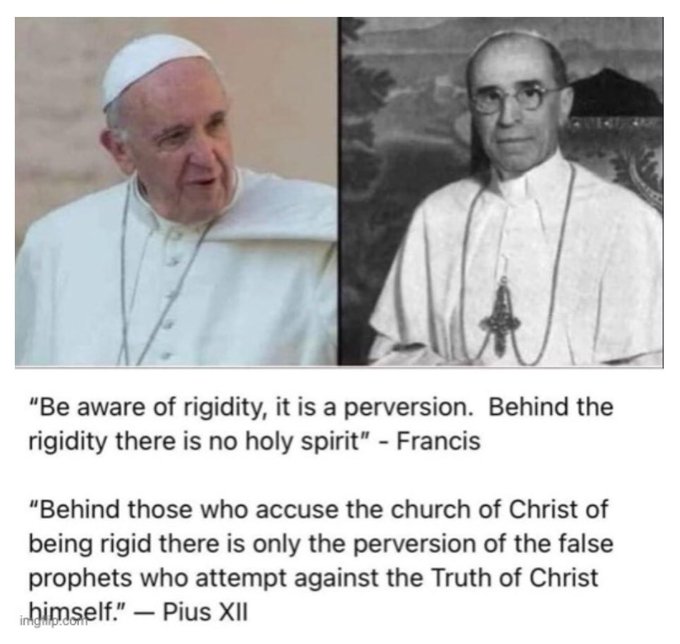Did Pope Pius XII call Francis a "False Prophet"?: "The Accusation of oppressive Rigidity made against the Church by the ‘New Morality [Amoris Laetitia],’ in reality, attacks, in the first place, the Adorable Person of Christ Himself”
Saint Catherine of Siena: Now is time to weep and mourn for the Bride of Christ is persecuted by her false and corrupt members. [http://4christum.blogspot.com/2017/05/pope-pius-xii-condemned-moral-situation.html]
The 4Christum website wrote that "Pope Pius XII condemned the 'moral situation' of Amoris Laetitia:
“Taking, therefore, the words of Christ and of the Apostle [Paul] as the strict rule, should not one say that the Church of today is rather inclined more to coddling than to severity? It so happens that the accusation of oppressive rigidity made against the Church by the ‘new morality,’ in reality, attacks, in the first place, the adorable Person of Christ Himself.”
RORATE CÆLI: Despite Pius XII being the reigning pope when the young Jorge Mario Bergoglio entered the Jesuit seminary as a novice, Pius' condemnations of this "new morality" seem to have had little effect on him. Besides his daily homilies that frequently criticize "rigid" faithful Catholics, Francis even told his fellow Jesuits he thought charges of "situation morality" are "boogey man" accusations, while endorsing Bernard Häring, a pro-contraception dissenting theologian...
...The magisterial interventions of Pius XII on situation ethics are remarkable, precisely for their prescience in anticipating and directly refuting Francis' key arguments for his own "new morality" in Amoris Laetitia and elsewhere.
Below you may find excerpts followed by the full text of five Magisterial documents from the papacy of Pope Ven. Pius XII which strongly, clearly, and solemnly condemn the heresy of situation ethics.
Contra doctrinam
Supreme Sacred Congregation of the Holy Office
Instruction on ‘Situation Ethics’
To All Ordinaries and to Teachers in Seminaries, in Athenaeums, or those Teaching in Universities of Studies, and to Lecturers in Houses of Religious Studies
February 2, 1956
Contrary to the moral doctrine and its application that is traditional in the Catholic Church, there has begun to be spread abroad in many regions, even among Catholics, an ethical system that generally goes by the name of a certain "Situation Ethics," and which, they claim, does not rest upon the principles of objective ethics (which ultimately is rooted in “Being” itself), rather, it is not merely subject to the same limit as objective ethics, but transcends it.
The authors who follow this system hold that the decisive and ultimate norm of conduct is not the objective right order, determined by the law of nature and known with certainty from that law, but a certain intimate judgment and light of the mind of each individual, by means of which, in the concrete situation in which he is placed, he learns what he ought to do.
And so, according to them, this ultimate decision a man makes is not, as the objective ethics handed down by authors of great weight teaches, the application of the objective law to a particular case, which at the same time takes into account and weighs according to the rules of prudence the particular circumstances of the "situation", but that immediate, internal light and judgment. Ultimately, at least in many matters, this judgment is not measured, must not and cannot be measured, as regards its objective rectitude and truth, by any objective norm situated outside man and independent of his subjective persuasion but is entirely self-sufficient.
According to these authors, the traditional concept of "human nature" does not suffice; but recourse must be had to the concept of "existent" human nature, which in many respects does not have absolute objective value, but only a relative and, therefore, changeable value, except, perhaps, for those few factors and principles that pertain to metaphysical (absolute and unchangeable) human nature.
Of the same merely relative value is the traditional concept of the "law of nature". Thus, many things that are commonly considered today as absolute postulates of the natural law, according to their opinion and doctrine, rest upon the aforesaid concept of existent nature and are, therefore, but relative and changeable; they can always be adapted to every situation.
Having accepted these principles and put them into practice, they assert and teach that men are preserved or easily liberated from many otherwise insoluble ethical conflicts when each one judges in his own conscience, not primarily according to objective laws, but by means of that internal, individual light based on personal intuition, what he must do in a concrete situation.
Many of the things set forth in this system of "situation ethics" contradict the truth of the matter and the dictates of sound reason, betray traces of relativism and modernism, and wander far from the Catholic doctrine handed down through the centuries. In many of their assertions they are akin to several non-Catholic ethical systems.
Having considered these things, in order to avert the danger of the “New Morality,” of which the Supreme Pontiff Pope Pius XII spoke in the Allocutions held on the days of March 23 and April 18, 1952, and in order to safeguard the purity and intactness of Catholic doctrine, this Supreme Sacred Congregation of the Holy Office interdicts and prohibits this doctrine of "Situation Ethics” from being taught or approved, under any name whatsoever it may be designated, whether in Universities, Athenaeums, Seminaries or houses of religious formation, or in books, dissertations, lectures, whether, as they say, at conferences, or by any other means of being propagated or defended.
Given at Rome, from the Palace of the Supreme Sacred Congregation of the Holy Office, on the day of February 2, of the year 1956.
Giuseppe Cardinal PIZZARDO, Bishop of Albano, Secretary
- Read more at: Rorate Caeli [http://4christum.blogspot.com/2017/05/pope-pius-xii-condemned-moral-situation.html]



Comments